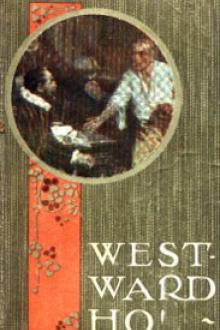Westward Ho! Or, The Voyages and Adventures of Sir Amyas Leigh, Knight, of Burrough, in the County of Devon, in the Reign of Her Most Glorious Majesty Queen Elizabeth by - (acx book reading .TXT) 📖

- Author: -
Book online «Westward Ho! Or, The Voyages and Adventures of Sir Amyas Leigh, Knight, of Burrough, in the County of Devon, in the Reign of Her Most Glorious Majesty Queen Elizabeth by - (acx book reading .TXT) 📖». Author -
But Frank's heart and head never failed him.
“Mr. Coffin!” said he, in a tone which compelled that gentleman to turn round, and so brought him under the power of a face which none could have beheld for five minutes and borne malice, so imploring, tender, earnest was it. “My dear Mr. Coffin! If my earnestness has made me forget even for a moment the bounds of courtesy, let me entreat you to forgive me. Do not add to my heavy griefs, heavy enough already, the grief of losing a friend. Only hear me patiently to the end (generously, I know, you will hear me); and then, if you are still incensed, I can but again entreat your forgiveness a second time.”
Mr. Coffin, to tell the truth, had at that time never been to Court; and he was therefore somewhat jealous of Frank, and his Court talk, and his Court clothes, and his Court company; and moreover, being the eldest of the guests, and only two years younger than Frank himself, he was a little nettled at being classed in the same category with some who were scarce eighteen. And if Frank had given the least hint which seemed to assume his own superiority, all had been lost: but when, instead thereof, he sued in forma pauperis, and threw himself upon Coffin's mercy, the latter, who was a true-hearted man enough, and after all had known Frank ever since either of them could walk, had nothing to do but to sit down again and submit, while Frank went on more earnestly than ever.
“Believe me; believe me, Mr. Coffin, and gentlemen all, I no more arrogate to myself a superiority over you than does the sailor hurled on shore by the surge fancy himself better than his comrade who is still battling with the foam. For I too, gentlemen,—let me confess it, that by confiding in you I may, perhaps, win you to confide in me,—have loved, ay and do love, where you love also. Do not start. Is it a matter of wonder that the sun which has dazzled you has dazzled me; that the lodestone which has drawn you has drawn me? Do not frown, either, gentlemen. I have learnt to love you for loving what I love, and to admire you for admiring that which I admire. Will you not try the same lesson: so easy, and, when learnt, so blissful? What breeds more close communion between subjects than allegiance to the same queen? between brothers, than duty to the same father? between the devout, than adoration for the same Deity? And shall not worship for the same beauty be likewise a bond of love between the worshippers? and each lover see in his rival not an enemy, but a fellow-sufferer? You smile and say in your hearts, that though all may worship, but one can enjoy; and that one man's meat must be the poison of the rest. Be it so, though I deny it. Shall we anticipate our own doom, and slay ourselves for fear of dying? Shall we make ourselves unworthy of her from our very eagerness to win her, and show ourselves her faithful knights, by cherishing envy,—most unknightly of all sins? Shall we dream with the Italian or the Spaniard that we can become more amiable in a lady's eyes, by becoming hateful in the eyes of God and of each other? Will she love us the better, if we come to her with hands stained in the blood of him whom she loves better than us? Let us recollect ourselves rather, gentlemen; and be sure that our only chance of winning her, if she be worth winning, is to will what she wills, honor whom she honors, love whom she loves. If there is to be rivalry among us, let it be a rivalry in nobleness, an emulation in virtue. Let each try to outstrip the other in loyalty to his queen, in valor against her foes, in deeds of courtesy and mercy to the afflicted and oppressed; and thus our love will indeed prove its own divine origin, by raising us nearer to those gods whose gift it is. But yet I show you a more excellent way, and that is charity. Why should we not make this common love to her, whom I am unworthy to name, the sacrament of a common love to each other? Why should we not follow the heroical examples of those ancient knights, who having but one grief, one desire, one goddess, held that one heart was enough to contain that grief, to nourish that desire, to worship that divinity; and so uniting themselves in friendship till they became but one soul in two bodies, lived only for each other in living only for her, vowing as faithful worshippers to abide by her decision, to find their own bliss in hers, and whomsoever she esteemed most worthy of her love, to esteem most worthy also, and count themselves, by that her choice, the bounden servants of him whom their mistress had condescended to advance to the dignity of her master?—as I (not without hope that I shall be outdone in generous strife) do here promise to be the faithful friend, and, to my ability, the hearty servant, of him who shall be honored with the love of the Rose of Torridge.”
He ceased, and there was a pause.
At last young Fortescue spoke.
“I may be paying you a left-handed compliment, sir: but it seems to me that you are so likely, in that case, to become your own faithful friend and hearty servant (even if you have not borne off the bell already while we have been asleep), that the bargain is hardly fair between such a gay Italianist and us country swains.”
“You undervalue yourself and your country, my dear sir. But set your mind at rest. I know no more of that lady's mind than you do: nor shall I know. For the sake of my own peace, I have made a vow neither to see her, nor to hear, if possible, tidings of her, till three full years are past. Dixi?”
Mr. Coffin rose.
“Gentlemen, I may submit to be outdone by Mr. Leigh in eloquence, but not in generosity; if he leaves these parts for three years, I do so also.”
“And go in charity with all mankind,” said Cary. “Give us your hand, old fellow. If you are a Coffin, you were sawn out of no wishy-washy elm-board, but right heart-of-oak. I am going, too, as Amyas here can tell, to Ireland away, to cool my hot liver in a bog, like a Jack-hare in March. Come, give us thy neif, and let us part in peace. I was minded to have fought thee this day—”
“I should have been most happy, sir,” said Coffin.
—“But now I am all love and charity to mankind. Can I have the pleasure of begging pardon of the world in general, and thee in particular? Does any one wish to pull my nose; send me an errand; make me lend him five pounds; ay, make me buy a horse of him, which will be as good as giving him ten? Come along! Join hands all round, and swear eternal friendship, as brothers of the sacred order of the—of what. Frank Leigh? Open thy mouth, Daniel, and christen us!”
“The Rose!” said Frank quietly, seeing that his new love-philtre was working well, and determined to strike while the iron was hot, and carry the matter too far to carry it back again.
“The Rose!” cried Cary, catching hold of Coffin's hand with his right, and Fortescue's with his left. “Come,
 Have you ever thought about what fiction is? Probably, such a question may seem surprising: and so everything is clear. Every person throughout his life has to repeatedly create the works he needs for specific purposes - statements, autobiographies, dictations - using not gypsum or clay, not musical notes, not paints, but just a word. At the same time, almost every person will be very surprised if he is told that he thereby created a work of fiction, which is very different from visual art, music and sculpture making. However, everyone understands that a student's essay or dictation is fundamentally different from novels, short stories, news that are created by professional writers. In the works of professionals there is the most important difference - excogitation. But, oddly enough, in a school literature course, you don’t realize the full power of fiction. So using our website in your free time discover fiction for yourself.
Have you ever thought about what fiction is? Probably, such a question may seem surprising: and so everything is clear. Every person throughout his life has to repeatedly create the works he needs for specific purposes - statements, autobiographies, dictations - using not gypsum or clay, not musical notes, not paints, but just a word. At the same time, almost every person will be very surprised if he is told that he thereby created a work of fiction, which is very different from visual art, music and sculpture making. However, everyone understands that a student's essay or dictation is fundamentally different from novels, short stories, news that are created by professional writers. In the works of professionals there is the most important difference - excogitation. But, oddly enough, in a school literature course, you don’t realize the full power of fiction. So using our website in your free time discover fiction for yourself. 




Comments (0)